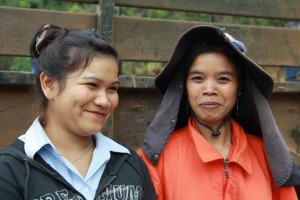Project Sekong 2012: We include women on a team to help advance their careers, but having a mixed team can create complications.

Kik and Pang Xi are both from a tiny village on the Bolevan Plateau, in southern Laos. The experience they gain while working on our team will give them an advantage if they apply for employment with other clearance organizations. Their success helps other women as well, by proving that females are every bit the equal to men in clearance work.
Report 4
Yai and I always arrive on site at least a week ahead of the rest of the team. We meet with village leaders, pick a site for camp, arrange for delivery of food and water, and begin logging reports of problem ordnance. By day six or seven we’re always eager for the full team to arrive and for the actual destruction of ordnance to begin.
The team arrived last evening about 9:00 PM, well after dark but under a full moon so there was light enough to unload the truck, sort equipment, and pitch tents for the night. Everyone seemed pleased with the campsite that Yai and I had chosen.
Then, a quandary. A careful search of the truck and the stacks of equipment already offloaded confirmed that we were one tent short. There ensued a few lively minutes of finger pointing until everyone finally decided that establishing blame was less important than finding a way for the entire team to comfortably bed down for the night.
Ordinarily, among our team, being one tent short would pose no problem; we’d just cozy up and squeeze into whatever shelter was available. In Laos, there’s always room for one more in the truck, one more in the tent, one more around the table. The problem was that, this year, we’ve again included two women on our team.
Out in the field every gal is just one of the guys but, in camp the women’s privacy must be respected and their reputations protected. It would be foolish to include female deminers on our team in an attempt to elevate the role of women, and then diminish respect for them by ignoring the propriety of their sleeping accommodations.
As usual, it was Yai who conceived of a solution. He hoped on our motorbike and dashed off to the naiban’s house to ask permission for the women to sleep in an empty room in the village clinic. (Since we had just that morning transported the clinic’s only patient to the provincial hospital, we knew there was space).
Yai returned with better-than-expected news. The naiban approved of the women sleeping in the clinic until such time as a patient needs the room. Then, if they must vacate the room, they are invited to move in with the naiban’s family for the duration of the project.
That hurdle crossed, the team bedded down comfortably and slept well after two arduous days on the road.
